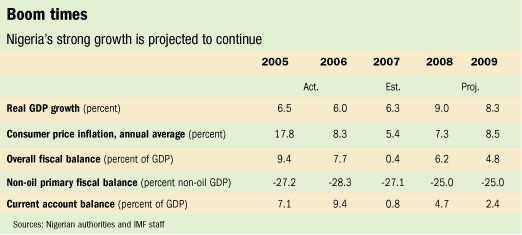
Typical street scene in Santa Ana, El Salvador. (Photo: iStock)
IMF Survey: Nigeria Needs Sustained Reforms to Build on Success
February 15, 2008
- Outlook positive as long as reforms are sustained and extended
- Inflation has been in single digits and targets are within reach
- Integration into global economy brings challenges for ensuring financial stability
Nigeria's current economic situation is the strongest in its recent economic history.

Workers on an oil rig in Nigeria where prudent management of oil savings and revenues is key to unleashing country's potential and to reducing poverty. (photo: AFP)
Annual IMF economic assessment
Growth is high, inflation is in single digits, and external and fiscal positions are strong (see table). The recapitalized banking sector and newly active financial markets are supporting private activity. These gains reflect implementation of Nigeria's homegrown reform program. The IMF supported these reforms through a two-year Policy Support Instrument that was concluded successfully late last year.
According to the IMF's annual assessment of the economy, released on February 15, prospects for growth in 2008 are good. In the oil sector, a rebound in production is anticipated; however, developments in the Niger Delta need to be watched. The non-oil sector, particularly in the areas of services and agriculture, has been growing strongly. Looking ahead, growth in the non-oil sector is on course to reach about 9 percent this year as long as weather conditions continue to support agriculture. Single-digit inflation targets are within reach helped by a strong naira. An increase in food prices, driven by unfavorable weather conditions, is the main risk to inflation.

However, challenges remain, particularly in three key areas—budgets and oil revenues, the financial sector, and private sector growth.
Managing oil revenues and oil savings
The success of recent budget policy in bringing about high growth and lower inflation also resulted in mounting oil savings. The presence of these savings has resulted in pressures, particularly by state governments, to spend more. Everybody agrees with the goals; a stronger public infrastructure is needed, particularly power, to support a growing private sector and there is a tremendous need to reduce poverty. The issue is what is the best budget policy and use of oil savings to deliver these goals?
Nigerians know better than anyone that the answer to this question is not simply to spend. Hundreds of billions of dollars have accrued from the oil sector in recent decades but unfortunately there is little to show for this in terms of lower levels of poverty. In these earlier episodes, spending of oil receipts resulted in a short term boom in growth but this was followed by low or even negative growth and massive accumulation of debt. In other words, Nigeria saw a harmful pattern of boom and bust that locked it into a low growth path.
In 2008, a carefully balanced policy stance is essential. Spending by all tiers of government should not be determined by whether oil prices are high or low. The various tiers of government must spend in line with the economy's needs and its ability to absorb those resources. The alternative is economic instability that results in the poor suffering and the private sector becoming uncompetitive. In sum, the success of the oil-price-based fiscal rule in containing spending to levels consistent with macroeconomic stability in recent years was central to the turnaround in Nigeria's economic performance; without a comparable policy anchor in the future the gains made are at risk.
Supervising the financial sector
The success of the reform efforts, dramatic reductions in external debt, and high oil prices are leading Nigeria along the path of emerging markets elsewhere in the world. This has given a new lease on life to Nigeria's financial sector. This is good news but it must be managed well to get the best results.
Accounting for about one third of sub-Saharan Africa GDP excluding South Africa, Nigeria is attracting great interest from global financial markets. Nigeria is integrating rapidly into these markets, including through a fivefold increase in government securities trading and a fourfold increase in stock market capitalization since 2005. The growth dividend is already evident in the form of increased bank lending across a range of sectors. At the same time, the challenge for monetary policy and of preserving financial stability will only intensify. The central bank needs to redouble its efforts to keep pace with the dramatic changes in the sector and to ensure that its supervisory capacity is commensurate with growth and activities in the banking sector.
Private sector growth is critical
The private sector must ultimately be the driver of growth, employment creation, and poverty reduction. Measures such as liberalizing the communications sector and privatization have paid off. But, much more needs to be done particularly in addressing the infrastructure gap that is the main impediment to growth. Limited power generation and weak distribution, along with a severe lack of transportation, raises the cost of business. By some estimates, the cost of power to the private sector is six or seven times the price paid by international competitors
The government's medium term fiscal strategy provides an adequate spending envelope to make meaningful progress in addressing the infrastructure gap, but attention must be paid to the quality of spending and to ensuring that projects are completed. Identifying the right role for the public and private sectors, prioritizing outlays, and strengthening public financial management are priorities.
The success of the reform program to date shows that the authorities' macroeconomic policy priorities have been centered on tackling the right bottlenecks and grasping available opportunities. Looking forward, the authorities recognize that macroeconomic stability is essential to translate the higher growth into a widespread increase in living standards. For this reason, the prudent management of oil savings and revenues is the key to unleashing Nigeria's potential and to reducing poverty.
Comments on this article should be sent to imfsurvey@imf.org.


